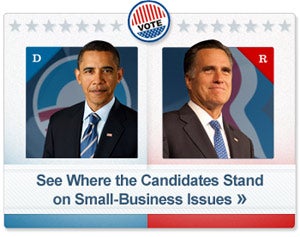7 Reasons Small Business Supports Romney (Opinion) Small-business owners overwhelmingly favor Mitt Romney over Barack Obama in the 2012 presidential election. Here are seven reasons why.
By Scott Shane Edited by Dan Bova
Opinions expressed by Entrepreneur contributors are their own.
If small-business owners alone voted, Mitt Romney would win the presidency handily. A recent Gallup poll of 9,925 employed, registered voters showed that 57 percent of business owners favor the Republican nominee, while 37 percent prefer President Obama.
Why does small business overwhelmingly favor the challenger? Here are seven reasons:
 1. Small-business owners generally believe Republicans support them more than Democrats. A January 2012 survey conducted by Harris Interactive for the U.S. Chamber of Commerce found that 84 percent of small-business leaders focus on a candidate's support for free enterprise. And 48 percent of small-business owners responding to a spring 2012 online poll by Manta believe Republicans support small business the most, while only 26 percent think Democrats do. The remainder thinks independents or minor party candidates are the biggest supporters of small business.
1. Small-business owners generally believe Republicans support them more than Democrats. A January 2012 survey conducted by Harris Interactive for the U.S. Chamber of Commerce found that 84 percent of small-business leaders focus on a candidate's support for free enterprise. And 48 percent of small-business owners responding to a spring 2012 online poll by Manta believe Republicans support small business the most, while only 26 percent think Democrats do. The remainder thinks independents or minor party candidates are the biggest supporters of small business.
Related: Listen to Small Business: Don't Increase the Minimum Wage (Opinion)
2. The preference for Romney reflects what's happened to small companies during the Obama presidency. While the past few years haven't been great for most people (save, perhaps, bill collectors), it's been worse for small-business owners than the rest of us. The number of self-employed people is only 0.6 percent higher now than when the President took office, Bureau of Labor Statistics data shows. By contrast, the number of people in the civilian labor force is 1.6 percent higher than when Obama was sworn in. Moreover, the number of self-employed heads of corporations is 2.3 percent below the January 2009 level.
3. Start-up rates have fallen significantly during the President's time in office. In 2008, 491,559 businesses were started, according to the Census Bureau, but in 2010, the latest year for which data is available, only 394,632 companies were founded.
4. Bankruptcies are higher now than at the start of the Obama presidency. According to the American Bankruptcy Institute, there were 322,973 bankruptcies in the first quarter of 2012, compared with 301,337 in the fourth quarter of 2008.
5. Credit remains tight for small businesses. Between 2008 and 2011, the number of small loans to business declined 22 percent, with the value of those loans dropping 18 percent in real terms.
Related: What an End to the Health-Care Law Could Mean for Small Business
6. Small-business owners object to major parts of the President's agenda, most notably health-care reform. According to the 2012 U.S. Bank Small Business Survey, small-business owners say health care is the business issue that will most affect their vote this fall, and is, what's more, the most important issue for them since the 2008 election. That isn't good news for the President. A January 2011 Discover Card Small Business Watch survey showed that a majority of small-business owners (55 percent) want the President's health-care reform law repealed.
7. Finally, small-business owners have a different philosophy about Washington's role than the President. While Obama says he wants to help them, 82 percent would prefer that Washington just "get out of the way" rather than offer a "helping hand," the Harris survey revealed.
Unfortunately for the Republicans, small-business owners are a small minority of the electorate, and they aren't disproportionately concentrated in swing states. In the end, their strong support for Romney won't make a big difference in the November election.
Related: Why Congress Shouldn't Fund Business Incubators (Opinion)










